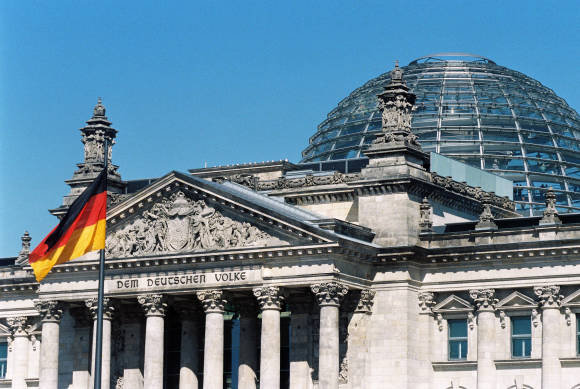Pressure on The Euro from Below: Germany, Strong Deutschemark and 'Das Deutsche Volk'
London, UK - 13th February 2010, 23:55 GMT
Dear ATCA Open & Philanthropia Friends
[Please note that the views presented by individual contributors are not necessarily representative of the views of ATCA, which is neutral. ATCA conducts collective Socratic dialogue on global opportunities and threats.]
It is worth paying close attention to the fast developing domestic situation in Germany. Most of the euro-zone bailout analysis and chatter does not really consider the domestic socio-economic and political constraints within 'Deutschland':
 ‘Dem Deutsche Volke’ inscribed in 1916 at The Reichstag, Berlin
‘Dem Deutsche Volke’ inscribed in 1916 at The Reichstag, Berlin
. 'Frankfurter Allgemeine', one of Germany's most respected newspapers, recently warned in an editorial: If euro-zone countries abandon the no-bailout principle, they would "sever the anchor line securing a stable euro. Germans will wish they had their Deutsche Mark back";
. Many German shops are looking at larger euro notes to determine if they were printed by the Germans and core euro-zone countries or southern European nations –- sometimes rejecting notes printed in countries viewed with suspicion;
. 'Die Welt', the conservative German newspaper, has also called on Greece to exit the euro zone altogether;
. The strong Deutschemark remains a symbol of Germany's post-World War II revival -- Das Wirtschaftswunder -- in the collective national psyche, until it was subsumed by the euro. Many ordinary Germans feel their good money is now being trashed via the potential euro-zone bailouts;
. As a result, there is an increasingly lowered probability that the German citizens are actually going to allow the conservative-liberal coalition government in Berlin to ride to the rescue of Greece, and then possibly Portugal and Spain;
. Germany also has its own banking problems and exposure to Eastern Europe to consider in the final bailout equation.
Memories of The Weimar Republic
Germany was traumatised by two world wars and an intervening period of high unemployment and loss of control over national economic health, prosperity and collective destiny. As a result, the German national psyche is very much geared towards preventing anything resembling those outcomes in the future.
Inflation Fears
In Germany, memories linger of the destructive hyper-inflation that followed World War I. Such fears have made many Germans wary of the european monetary union right from the outset. Former Chancellor Helmut Kohl and other German leaders sold the euro to a sceptical German public, in part, on the premise that weaker European economies such as Greece and Portugal would adopt the best practices of Germany and France, and make their economies more productive while keeping inflation at bay and their finances in order. This has clearly not happened.
Deutsche Bundesbank
Bundesbank President Axel Weber recently said: "Politically, it would not be possible to tell [German] voters that one country is being helped out so that it can avoid the painful savings that other countries have made. Such aid, whether it is conditional, or -- even worse -- unconditional, is counterproductive." Germany's central bank, the Bundesbank, is an institution held in reverence by many Germans. It has long warned against making Germany the euro zone's bank of last resort. In fact, when the single currency was going through its birth pangs in the 1990s, the Germans insisted its Frankfurt-based guardian, the European Central Bank, be modelled on Germany's Bundesbank, with the paramount tasks being monetary policy, low inflation, and currency stability overseen by an independent authority.
Financial Indiscipline
Since the euro was launched -- as an accounting currency in 1999 and as cash in the new millennium, the PIIGS -- Portugal, Ireland, Italy, Greece and Spain -- countries have instead allowed the low interest rates and stable currency that came from euro membership to fuel housing and excessive consumption binges.
Growth and Stability Pact
The thinking at the time of the launch of the euro single currency was that the stability and growth pact (SGP) would rein in any excesses. However, when France and Germany both breached the magic 3% federal government deficit hurdle of the SGP, all bets were off. After that, the PIIGS countries could deficit spend with greater largesse -- some now in excess of 10% per annum -- and point to core Europe’s biggest nations as an excuse!
Conclusion
Ordinary Germans are concerned that Greece's problems could spill over to the rest of the euro currency union in the near future and may encompass other PIIGS countries. Germany's greatest challenge in crafting European rescue packages for those countries could come in winning the support of those expected to pay the biggest share of the bill, ie, its own citizens. German citizens are not powerless because their collective vote-banks hold sway to exert significant pressure -- direct or indirect -- on the conservative-liberal coalition government in Berlin.
The PIIGS countries would be pleased to navigate out of the current crisis in a painless way, through loans or loan guarantees to Greece or the issue of common Eurobonds, opening the way for more bailouts of the others. But Germany, the European Union's traditional paymaster, is ultimately going to have none of it and stick to the letter of the Maastricht treaty which established the single currency and denounces bailouts of other eurozone countries. Why? Berlin is coming under increasing pressure from below -- from the German people or 'Das Deutsche Volk' -- to do exactly that! If not, what is the final choice, go back to the trusted and strong Deutschemark?
[ENDS]
We welcome your thoughts, observations and views. To reflect further on this subject and others, please respond within Twitter, Facebook and LinkedIn's ATCA Open and related discussion platform of HQR. Should you wish to connect directly with real time Twitter feeds, please click as appropriate:
. ATCA Open
. @G140
. mi2g Intelligence Unit
. Open HQR
. DK Matai
Best wishes

